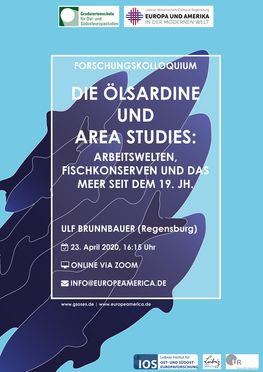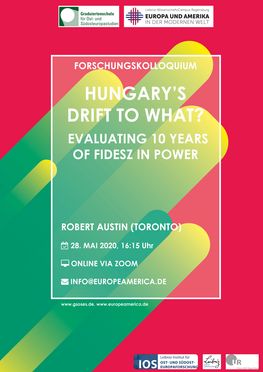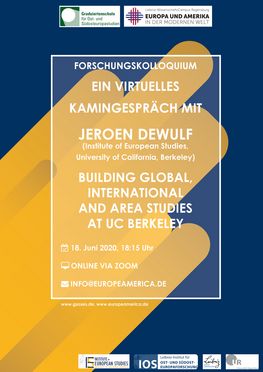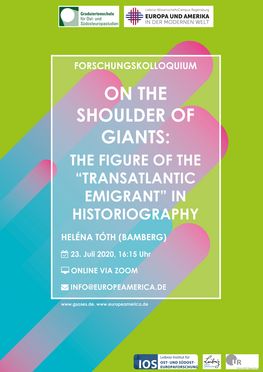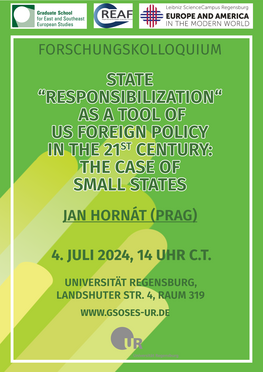Research Colloquium
The Research Colloquium is organised jointly by the ScienceCampus and Graduate School for East and Southeast European Studies in Regensburg. Click the titles or posters for details of the upcoming talks, while information on past events in this series are outlined below. The events organised by the ScienceCampus with the Graduate School form part of the broader Colloquium in the History and Social Anthropology of Southeastern and Eastern Europe. This event takes place each Thursday during the semester at 14:15 (with occasional exceptions). The programme will be updated over the coming weeks!
Winter Semester 2025/26
16.10.2025 | 14:15 |Room 319, Altes Finanzamt, Landshuter Str. 4
Practicing Transnational History
Diana Mishkova (Sofia) & Roumen Daskalov (Sofia)
13.11.2025 | 14:15 | Room 319, Altes Finanzamt, Landshuter Str. 4
Setting up Shop in the House of Hangman: Jewish economic life in postwar Germany
Anna Holian (Arizona)
11.12.2025 | 14:15 | Room 017, Altes Finanzamt, Landshuter Str. 4
Socialist Law of Energy Exchange: Fossil Base and Cultural Superstructure
Ilya Kalinin (Berlin)
15.01.2026 | 14:15 | Room 017, Altes Finanzamt, Landshuter Str. 4
Food Chemistry and the Soviet Quest for Development after World War II
Elena Kochetkova (Bergen)
Summer Semester 2025
8 May2025 | 14:30 | S. 214 UR Campus
The Polish-Ukrainian Reconciliation Process and Beyond
Magdalena Nowak (Gdańsk)
This lecture presents the Polish-Ukrainian reconciliation process (its phases 1989/90–2025) and its historical background: The Polish-Ukrainian Conflict in the 19th and 20th history (the Polish-Ukrainian War 1918–1919, The Volhynia Massacre, The Vistula Action 1947). Current development of the reconciliation and its future perspectives will be also reflected upon during the lecture.
Assoc. Prof. Dr. hab. Magdalena Nowak has been affiliated with the Institute of History at the University of Gdańsk since 1996, where she has held various academic and administrative roles, including Deputy Dean for Students and Education (2008–2012) and head of the Historical Tourism Working Team (2015–2019). She earned her PhD in Humanities in 2004 and completed her habilitation in 2019, both at the University of Gdańsk. Her research focuses on Polish-Ukrainian relations in the 19th and 20th centuries, the interplay between Latin- and Greek-rite Catholic traditions, the national consciousness of Poles and Ukrainians, and the identity of Metropolitan Archbishop Andrei Sheptyts’kyi. Her monograph on Sheptyts’kyi has received multiple academic awards and is being translated into Ukrainian. Prof. Nowak is an active member of several scholarly associations, including ASEEES, MAG, and the Polish History Society.
22 May 2025 | 14:15 | Room 319, Altes Finanzamt, Landshuter Str. 4
Restorations of Architectural Monuments and the Politics of Heritage in Romania and Serbia in the Late 19th Century
Cosmin Minea (Bucharest)
Towards the end of the nineteenth century, the recent independent states of Serbia and Romania undertook a very similar restoration project that transformed in a visual and symbolic manner one of their most famous Orthodox churches. In Romania, the French architect André Lecomte du Noüy led the restoration of Curtea de Argeș church (sixteenth century), where he added frescoes, interior and exterior decorations, monastery buildings and a chapel, turning the site into a symbol of Romanian heritage and the resting place for Romanian kings. Similarly, in Serbia architect Petar J. Popović led the restoration of Lazarica Church (fourteenth century), incorporating new domes, exterior decorations, and towers. Starting from these projects, the talk will reflect on the role of architectural monuments for the state-building, national ideology, religion and local communities in the two former Ottoman regions. It will also emphasize the role of transnational network of architects and specialists together with ideas about Byzantine Art in fin-de-siecle Europe.
Cosmin Minea earned his PhD from the University of Birmingham in 2020 with a dissertation titled Old Buildings for Modern Times: The Rise of Architectural Monuments as Symbols of the State in Late 19th-Century Romania. His MA thesis, completed at Central European University in Budapest in 2014, was awarded the Hanák Prize for the best dissertation in the Department of History. Currently, he is Czech Science Foundation (GAČR) postdoctoral researcher with the project ‘The First Histories of Architecture and the Creation of National Heritage in South-Eastern Europe (1860-1930). A Transnational Approach’ in the Art History Department at Masaryk University in Brno, and co-leader of the Environmental Humanities working group at the LSC partner institution the New Europe College in Bucharest.
His research focuses on the transnational networks of architects and intellectuals who, in late 19th-century Romania, were instrumental in shaping, restoring, and promoting historical monuments and heritage sites as part of wider efforts to forge a national cultural identity.
5 June 2025 | 14:15 | Room 017, Altes Finanzamt, Landshuter Str. 4
Gender and Transitional Temporalities in Kosovo
Vjollca Krasniqi (Prishtina)
The presentation explores the role of sexual and gender-based violence (SGBV) in transitional justice. Using Kosovo as a case study, it focuses, in particular, on how the concept of time influences gender discourses and restorative and retributive processes. Recent scholarship has called for more nuanced approaches to understanding temporalities in transitional justice, emphasizing the continuous nature of violence, the entangled experiences of past and present, and the spectres of unresolved injustices (Zunino 2024; Clark 2023; Miller 2023; McAuliffe,2021). The article underscores the importance of lived and subjective time in dissecting the structures of SGBV gender discourses. It also shows how discourses and narratives play a role in (re)defining gender and power relations as well as concepts of justice. Based on testimonies of survivors of wartime sexual violence, the analysis concentrates on the relationship between the past and present, highlighting the significance of survivors’ narratives, memories of violence and metaphors of war. It is argued that while gender is constructed and negotiated through discourse, one must address temporality to understand – and respond to – the shortcomings of transitional justice mechanisms. This applies especially to efforts that are meant to foster meaningful women’s agency in seeking justice for wartime sexual violence. This awareness is critical for creating redress processes that truly transform societies and acknowledge the lived realities of those affected.
Vjollca Krasniqi is Associate Professor of Sociology and Gender at the Faculty of Philosophy, University of Prishtina, Kosovo. Her research explores gender, nation, transitional justice, memory politics, urban studies, social history, ethnography, and oral history, with a focus on gender dynamics in post-socialist and post-war Kosovo. She has published extensively on these topics, contributing numerous book chapters and articles in peer-reviewed journals. Her recent publications include: “Between transformation and marginality: Urban life and socially engaged art at the fringe of Prishtina” (co-author with Blerta Hoçia, 2025); “Gender and Transitional Justice: Recognition and Reparations of Wartime Sexual Violence in Kosovo” (2024); “The role of community-university engagement in strengthening local community capacity in Southeastern Europe” (co-author with Carmen Luca Sugawara et al., 2023); and “Skirts and Words: The Art of Acknowledgment, War Time Rape and Albanian Nationhood in Kosovo” (co-author with Ivor Sokolić and Denisa Kostovicova, 2020). Vjollca Krasniqi teaches two courses at the University of Regensburg during the Summer Semester of 2025: “Gender and (Slow) Memory: Feminist and Intersectional Approaches” and “Women’s Movements: Comparative Perspective”.
Tuesday 15 July 2025 | 14:15 | Room 017, Altes Finanzamt, Landshuter Str. 4
Necroheritage
Ewa Domańska (Poznań)
This theoretical talk will outline the main ideas and concepts of “necroheritage,” focusing particularly on remains, artifacts, mass graves, clandestine burial sites, and killing sites as a specific type of cultural-natural heritage. I will introduce the concept of “necrocide” in the context of mass killings and genocides to refer to the mechanical and chemical destruction of remains and graves intended to conceal mass crimes and obstruct or at least impede the identification of victims. The project highlights also the importance of “exhumates,” artifacts and ecofacts extracted from graves during exhumations that serve as evidence of crimes and provide deep insights into the past lives of humans and environmental changes caused by human intervention. I will consider postanthropocentric ethics to address artifacts, ecofacts, and various non-human entities that participate in or bear witness to processes of destruction and decomposition. By integrating heritage, forensics, and ecological studies, necroheritage addresses historical, social, ecological, and ethical considerations, providing critical insights into the ontology of human and non-human remains and things, the ecology of (mass) graves, religious and spiritual aspects of remains and sites, memory, and future-oriented strategies for contemplating, researching, managing, and commemorating mass killing sites.
Ewa Domańska is Full Professor of Human Sciences at the Faculty of History, Adam Mickiewicz University, Poznań, Poland; a corresponding member of the Polish Academy of Sciences (PAS); since 2002, recurring visiting professor at Stanford University (Spring Term). Her teaching and research interests include the theory and history of historiography, comparative theory of the humanities and social sciences as well as the environmental humanities, ecocide and genocide studies. Domańska’s recent publications include: Knowledge in the Shadow of Catastrophe (co-edited with Katarzyna Bojarska, et al., Brill 2024); A História para além do humano [History Beyond the Human], eds. Julio Bentivoglio and Taynna Marino (Rio de Janeiro: Fundação Getulio Vargas Press, 2024). With Jacek Małczyński Domańska is a guest editor of a special issue on “The Environmental History of the Holocaust” (Journal of Genocide Research, vol. 22, no. 2, 2020).
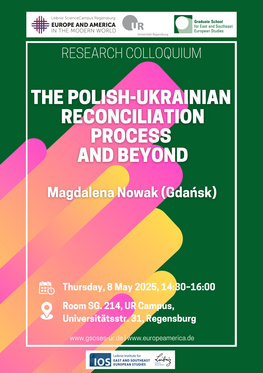
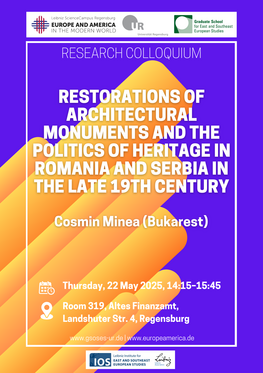


Winter Semester 2024/25
17 October 2024 | 14:15
Spitting on the Streets of Grosny. Culturedness and social distinction in a multinational Soviet city
Walter Sperling (Berlin/Bonn)
In my case study of multiethnicity in Grosny, an oil city in the North Caucasus, I propose to use nationality as a social category in a way that does not eliminate its ethnic aspects but avoids essentializing it. Analyzing contemporary sources, oral history interviews, ego-documents, and photo albums, I argue that in everyday life a certain habitus, corresponding to the Soviet concept of "culturedness" (kul'turnost'), was often more important than nationality in distinguishing peoples, although the latter remained a category promoted by the Soviet party-state. By making visible the reinterpretations and hybridizations of hegemonic concepts and categories, my paper sheds light on processes of acculturation as well as social conflicts within late Soviet society at its multiethnic periphery. It suggests that acculturation, as well as the conflicts amplified by the growing economic crisis, preconfigured the dynamics of politicization in the perestroika period and its violent outcome in the 1990s in the Caucasus.
Walter Sperling holds a Ph.D. from the University of Bielefeld (2010), following positions at Ruhr University Bochum and Ludwig Maximilian University in Munich. His research focuses on the cultural and social history of the 19th and 20th centuries, multiethnic societies in the Russian Empire and Soviet Union, memory anthropology in the post-Soviet space, and the history of the Caucasus. In his latest book Vor den Ruinen von Grosny (2023), he explores the Soviet Union as a multiethnic state, examining how diverse communities coexisted in Soviet cities after periods of violence and upheaval.
21 November 2024 | 14:15
Approaching Southeastern Europe from Brussels: Migration policies as security and stability instruments for the EU
Ruth Ferrero-Turrión (Madrid)
European migration policies have primarily focused on two main issues: control and security. As early as 2003, with the adoption of the Solana Strategy, migration was introduced onto the EU's political agenda as a security concern. In the years that followed, a comprehensive system of securitization and externalization of migration policies was established. The recent Pact on Migration and Asylumis the latest in a series of political documents aimed at the same goal: controlling migration flows.
Southeastern Europe is no exception to this trend. While Croatia and Slovenia are already EU members, the countries of the Western Balkans are candidates for EU membership. This candidate status is a significant factor in their relationship with the EU, as migration has become a key issue in negotiations. In many cases, the handling of migration is seen as a trade-off to receive EU funding, while at the same time, it has become a reason for these countries' exclusion from the EU enlargement process.
Ruth Ferrero-Turrión is a Professor of Political Science and European Studies at the Complutense University of Madrid (UCM) and an Associate Researcher at the Complutense Institute for International Studies (ICEI-UCM). She specializes in migration, European Union policies, and Balkan studies, directing related programmes at UCM, publishing extensively in Spanish and English on these subjects. She has held research fellowships at institutions like Columbia University and the London School of Economics and has served as a political advisor for the Spanish Government. Prof. Ferrero-Turrión is also a consultant for international organizations and a regular contributor to media outlets such as El Periódico and Esglobal.
30 January 2025 | 14:15
Socialist Modernist Worldmaking: Yugoslav Interventions in the International Humanitarian Debates in the 1970s
Čarna Brković (Mainz)
The Red Cross of Yugoslavia invited the International Red Cross Movement in the 1970s to reconsider its humanitarian principles and include perspectives from the countries belonging to the Non-Aligned Movement. The organization created an alternative humanitarian imaginary that both challenged and reproduced the premises of the humanitarian sector in the West. This largely forgotten episode in the history of humanitarianism presented an attempt at worldmaking, not of a world free from the coloniality/modernity nexus, but of a socialist modernist world that was in many aspects different from the one that had been built since the 1970s.
6 February 2025 | 14:15
Speaking Hebrew in the Russian Empire: Uri Nissan Gnessin's Poetics of Literary Dubbing
Natasha Gordinsky (Haifa)
My presentation focuses on modernist writings of Uri Nissan Gnessin (1879–1913). While situating his prose within the geopolitical and cultural context of an empire, I will employ Mikhail Bakhtin’s concept of heteroglossia and Ben Tran’s notion of “literary dubbing” to interpret Gnessin’s groundbreaking Hebrew debut, “Zhenya” (1903). I will argue that the Hebrew language serves as one of the main protagonists in this short story. Gnessin’s text centers on the themes of reading and writing in Hebrew, as well as translating from Hebrew to Russian, which are integral to the plot. Simultaneously, his early fiction functions as a laboratory for testing the poetic possibilities of envisioning Hebrew as both a vernacular and an oral language.
Natasha Gordinsky is a Senior Lecturer at the Department of Hebrew and Comparative Literature at the University of Haifa and holds a PhD in Hebrew literature from Hebrew University of Jerusalem. Her current research focuses on Hebrew modernism and on contemporary translingual literature. She is an author of two books: “Ein elend schönes Land.” Gattung und Gedächtnis in Lea Goldbergs hebräischer Literatur, transl. by Rainer Wenzel, Göttingen 2019 (first publ.: In Three Landscapes. Leah Goldberg’s Early Writings, Jerusalem 2016 [Heb.]); Kanon und Diskurs. Über Literarisierung jüdischer Erfahrungswelten, Göttingen 2009 (with Susanne Zepp). She has recently co-edited two volumes: In Their Surroundings. Localizing Modern Jewish Literatures in Eastern Europe, Vandenhoeck & Ruprecht,2023 (together with Efrat Gal-Ed, Sabine Koller and Yfaat Weiss) and Disseminating Jewish Literatures. Knowledge, Research, Curricula, De Gruyter 2020 (together with Susanne Zepp, Ruth Fine, Kader Konuk, Claudia Olk and Galili Shahar)
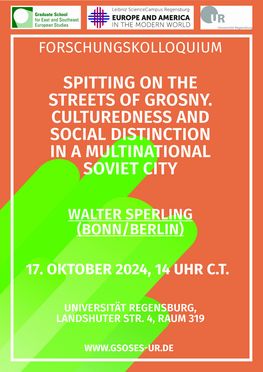


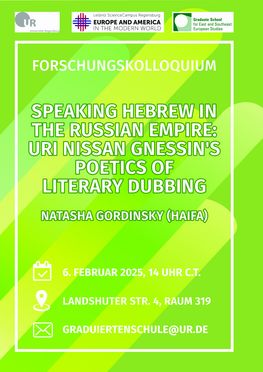
Summer Semester 2024
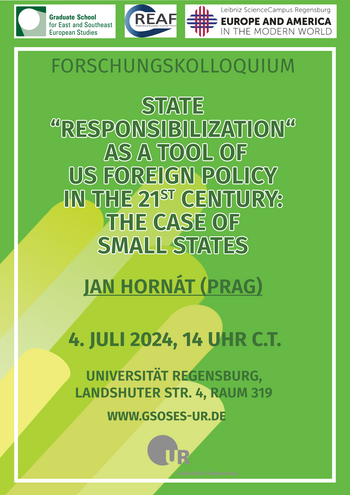 4 July 2024 |14:15
4 July 2024 |14:15
State “Responsibilization” as a Tool of US Foreign Policy in the 21st Century: The Case of Small States
Jan Hornát (Prague)
The 21st century is marked by the “ubiquity of responsibility talk” in global politics. However, these demands for “responsible” behavior do not cater just to moral aspirations – they are the subtle techniques of power within the liberal international order (LIO), falling squarely in line with the Foucauldian concept of responsibilization. Why do states assume responsibilities? Who formulates these responsibilities and do states accept responsibilities voluntarily or are they coerced into acceptance? How important is the ability to define "responsible behavior" in international affairs? In this sense, the talk will explore the role of the United States in coordinating and inducing responsibilization as a technique of power that is conducive to the reproduction of the LIO and the sustainability of Washington’s hegemonic status.
Jan Hornát works as a researcher at the Center for EU-Asia Relations. He studied international territorial studies at the Faculty of Social Sciences (Ph.D.) and American studies (PhDr.) at Charles University. In addition, he works as Head of Department of North American Studies at the Institute of International Studies, Faculty of Social Sciences, Charles University. In the past he was Head of Unit at the Department of European Programs at the Ministry of Justice (2014–2015). His professional interests include US domestic and foreign policy, US relations with the Asia-Pacific region, American political thinking, the transition to democracy, democratization theory, development cooperation, territorial disputes (focusing on the South China Sea, East China Sea and the Arctic) and geopolitics of the Indian Ocean region.
 6 June 2024 | 14:15
6 June 2024 | 14:15
Resurrecting the Jew: Nationalism, Philosemitism, and Poland’s Jewish Revival
Geneviève Zubrzycki (Ann Arbor)
Since the early 2000s, Poland has experienced a remarkable Jewish revival, largely driven by non-Jewish Poles with a passionate new interest in all things Jewish. Klezmer music, Jewish-style restaurants, kosher vodka, and festivals of Jewish culture have become popular, while new museums, memorials, Jewish studies programs, and Holocaust research centers reflect soul-searching about Polish-Jewish relations before, during, and after the Holocaust. In Resurrecting the Jew, Geneviève Zubrzycki examines this revival and asks what it means to try to bring Jewish culture back to life in a country where 3 million Jews were murdered and where only about 10,000 Jews now live.
Drawing on a decade of participant-observation in Jewish and Jewish-related organizations in Poland, a Birthright trip to Israel with young Polish Jews, and more than a hundred interviews with Jewish and non-Jewish Poles engaged in the Jewish revival, Resurrecting the Jew presents an in-depth look at Jewish life in Poland today.
Geneviève Zubrzycki (Ann Arbor)
Geneviève Zubrzycki is William H. Sewell Jr. Collegiate Professor of Sociology at the University of Michigan, where she directs the Weiser Center for Europe and Eurasia and the Copernicus Center for Polish Studies. A historical and cultural sociologist, she has published widely on nationalism and religion; collective memory, national mythology and the politics of commemoration; and visual culture and materiality. She’s the author of the award-winning The Crosses of Auschwitz: Nationalism and Religion in Post-Communist Poland (2006), Beheading the Saint: Nationalism, Religion and Secularism in Quebec (2016), and Resurrecting the Jew: Nationalism, Philosemitism and Poland’s Jewish Revival (2022).In 2021 Zubrzycki was the recipient of a Guggenheim fellowship and was awarded the Bronislaw Malinowski Prize in the Social Sciences from the Polish Institute of Arts and Sciences of America. Her latest book, Resurrecting the Jew, was awarded the Wayne S. Vucinich Prize by the Association for Slavic, East European, & Eurasian Studies for the most important contribution to Russian, Eurasian, and East European studies in any discipline of the humanities or social sciences, and the Rachel Feldhay Brenner Award by Polish Institute of Arts and Sciences of America for its contribution to Polish-Jewish Studies.
She has spent the month of June 2024 in Regensburg as a visiting fellow of the ScienceCampus.
 23 May 2024 | 18:15
23 May 2024 | 18:15
Yugoslav Albanian Labour Migration as a Microcosm of (In)visible Mobilities
Rory Archer (Graz)
This talk seeks to unpack the interlocking and historically contingent nature of the mobilities of Yugoslav Albanians in the Cold War era. Based on a research project examining labour migration from the peripheral Yugoslav Southeast to the core Northeast of the county during late socialism (i.e. domestic migration), the empirical data gathered points to the importance and endurance of previous mobilities as well as lateral migration to neighbouring and more distant lands alike. The research has led the team to unexpected phenomena like Albanian-operated Hawala (informal banking) in post-Prague Spring Czechoslovakia, informal business dealings across Cold War borders, the memory of post-imperial entrepreneurialism linking rural Macedonia to centres like inter-war Bucharest and Istanbul, and the presence of Albanian businesspeople in non-aligned, postcolonial Zambia. I propose that the case of Yugoslav Albanian migration and mobility was a largely institutionally invisible phenomenon. This is despite Albanian lands becoming, in the words of migration scholar Russell King, ‘a laboratory for the study of migration and development’ in the postsocialist era. ‘Change from below’ as a result of migration and mobility, resulted in profound transformations for the Yugoslav Albanian protagonists concerned. I suggest that such processes can be effectively studied through a methodological framework of bottom-up social and labour history.
Rory Archer is a social historian of 20th-century Southeast Europe, holding a PhD from University of Graz in 2015. Based in Austria for the past decade, he focuses on Yugoslavia's social history, particularly labor, gender, socialism, housing, everyday life, and popular culture. He is experienced in working through oral history, grounded theory and other qualitative, interpretive methods which link social science approaches to social history research. He was Mellon Post-Doctoral Research Fellow at the UCL School of Slavonic and East European Studies from 2016–2018 and joined the Chair of East European History at Konstanz University in 2019 as a lecturer and postdoc. At the Central European University, Budapest and the University of Belgrade he teaches as a visiting lecturer. Currently, Rory leads a project (2020–2024) on the history of intra-Yugoslav Albanian migration during late-socialism.
 25 April 2024 | 16:15
25 April 2024 | 16:15
The Restless Generation: Soviet Retirees and the Meanings of Active Old Age, 1950s–1970s
Alissa Klots (Pittsburgh)
Between 1956 and 1964 Nikita Khrushchev introduced a universal pension system that created the first massgeneration of Soviet retirees. While the state hailed the reform as a major achievement, the loss of millions of citizens to the non-productive and apolitical domestic sphere presented a problem for the regime that was built on political and labor mobilization. To encourage pensioners’ continuous engagement with the socialist project, the official discourse offered them a new, socialist vision of old age. A model Soviet retiree was not to rest, but to volunteer as a member of one of the numerous public organizations. This presentation will explore this vision of restless old age and the ways Soviet retirees engaged with it.
Allisa Klots is Assistant Professor of History at the University of Pittsburgh. Her first book "Domestic Service inthe Soviet Union: Women’s Emancipation and the Gendered Hierarchy of Labor" (Cambridge University Press, May 2024) is the first study of paid domestic labor in the Soviet Union. Her current project "The Restless Generation: Soviet Retirees and the Meanings of Active Old Age, 1950s–1970s" explores the meanings of old age and retirement for the first generation of builders of communism and their role in the development of late socialism. Her work has been supported by the Andrew W. Mellon Foundation, Open Society Foundations, Dan David Foundation, and the Humboldt Foundation.
Winter Semester 2023/24
 19 October 2023 | 14:15
19 October 2023 | 14:15
Historische Reenactments in der DDR. Lebendige Geschichte zwischen eigensinniger Freizeitgestaltung und Geschichtspolitik
Juliane Tomann (Regensburg)
Historische Reenactments erfreuen sich in der Gegenwart großer Beliebtheit, sowohl beim Publikum als auch bei den Darstellenden. Als Großereignisse sind die nachgestellten historischen Schlachten zu global-vernetzten Phänomenen geworden. Trotz ihrer Bedeutung für die rezente Geschichtskultur wissen wir über die Entstehungsgeschichte des Phänomens in Europa bisher wenig - das gilt besonders für die Entwicklung in der DDR und dem östlichen Europa. Im Vortrag stelle ich die Reenactment-Szene in der DDR von ihren Anfängen in den 1970er Jahren bis 1989 in den Mittelpunkt und beleuchte damit einen spezifischen Aspekt der DDR-Alltagskultur.
Historical reenactments are particularly popular today among both audiences and actors. As large-scale events, the reenacted historical battles form part of a globally-networked phenomenon. Despite their significance in contemporary historical culture, we know relatively little about the origins of this phenomenon in Europe. This is all the more the case for the former German Democratic Republic and Eastern Europe. This talk offers an outline of the reenactment culture of the GDR from its beginnings in the 1970s through to 1989, illustrating a particular aspect of everyday life and culture in East Germany.
Juliane Tomman obtained her doctorate in history (specializing in modern history) in 2015 from Freie Universität Berlin. Her thesis on historical culture in structural change in the Upper Silesian city of Katowice was awarded the Scientific Award of the Ambassador of Poland in 2015. Since December 2021, Juliane Tomann has been Junior Professor for Public History at Universität Regensburg. Since February 2022 she has been working as Director of Research at the Center for Commemorative Culture (Zentrum Erinnerungskultur) at the University of Regensburg. She is an associated researcher at the Leibniz ScienceCampus and PI at the Graduate School.
 14 December 2023 |16:15
14 December 2023 |16:15
Getting 'Away from Moscow': Another 'Zelensky Effect'
Valeria Korablyová (Prague)
The lecture breaks through the perception of Ukraine as a ‘cleft country’ (Huntington 1996) that essentialises the pro-European vs pro-Russian cleavage along the regional and ethnic lines (Central-Western vs South-Eastern Ukraine, ethnic Ukrainians vs ethnic Russians, Ukraino- vs Russophones, etc). While Ukraine has always been a heterogenous polity, differences cannot be easily mapped: identities and allegiances are flexible and fluid, while the main salient trend is the steadily increasing embrace of the Ukrainian national identity that goes hand in hand with the pro-European orientation. Another crucial trend is that Ukrainians have refrained from voting for ardent nationalists, vilified by decades of the Russian propaganda (the self-colonization effect). However, while in office, politicians – from Kuchma to Zelensky – elected on a ‘moderate’, often Russia-appeasing, mandate, gravitate towards stronger nationalist rhetoric. (The only exception was Viktor Yanukovych, ousted by a mass protest for that very reason.) Picking up on Onuch and Hale’s idea (2022) that Ukrainian President embodies rather than generates tendencies, I call it “another Zelensky effect”, which will be explicated in the lecture.
Valeria Korablyova is Assistant Professor, Department of Russian and East European Studies; Head of the Ukraine In A Changing Europe Research Centre, Institute of International Studies, Charles University. She works on post-Soviet transformations in Ukraine and the region, with a special focus on mass protests, grassroots nation-building, and performative politics. She received her habilitation (D. of Sc. degree) in 2015 from Taras Shevchenko National University of Kyiv.

18 January 2024 |14:15
Anti-Gender Movements and Regional Contestations of LGBTQ+ Rights and Gender Equality in the Context of Russia's War in Ukraine
Maryna Shevtsova (Leuven)
The so-called clash of European and traditional family values has for years served as a political tool for various actors andhas culminated in turning into one of the justifications for Russia's aggression against Ukraine. The idea behind this talk isto reflect on how the shifting regional security landscape is reconfiguring the struggles between opponents of sexual andgender equality and LGBTQ movements in Ukraine and Georgia with the full-fledged Russian aggression, on the one hand,and increased credibility of EU membership and approximation of the countries in the EU neighborhood with Brussels. The talk will discuss how the full-scale invasion has engendered an unlikely coalition between right-wing and LGBTQ groups inUkraine as part of a fight for the nation’s survival and emancipation from Russia. Building on a combination of qualitativemethods, including critical discourse analysis and frame analysis, the talk will provide original evidence on how theRussian invasion of Ukraine reconfigures anti-genderism and its effects on LGBTQ lives in the Eastern European regioncontributing to ongoing debates on the role gender and sexuality play within international security.
Maryna Shevtsova is a human rights and LGBT rights activist, bringing an interdisciplinary background to her work (International Economic Relations, Gender Studies, Psychology, Political Science). In 2017, she successfully obtained her PhD in Political Science from Humboldt University, Berlin. Currently, Maryna serves as a FWO senior postdoctoral fellow at KU Leuven, Belgium.
This event was organised in cooperation with the equal opportunities officers of the GS OSESUR.
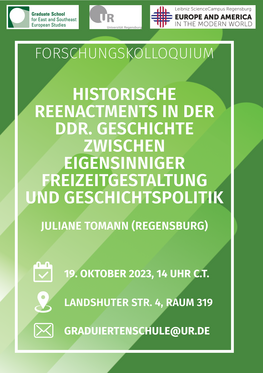

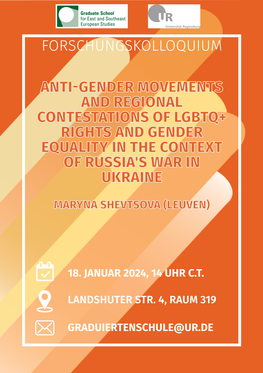
Summer Semester 2023
 20 April 2023
20 April 2023
Area Studies in the 21st century: A Sum of Areal Knowledges, or a Field of Theoretical Innovation and Experimentation?
Zoran Milutinović (London)
The speaker will argue that Area Studies should generate questions which no single discipline can ask. Their proper object will keep appearing as a result, not as a starting point. In order to do this, Area Studies should become metaphorical rather than metonymical. The former abandons the pretence of offering total, integrated knowledge and full comprehension, and substitute it with intensity of insight. Area Studies should not become a sum total of areal knowledges, but a meta-discipline which inspires disciplinary efforts, a field of theoretical innovation and experimentation in which new questions are asked, conceptual vocabularies proposed, and new perspectives tested. This would mean being in a permanent crisis, constantly seeking subversion of themselves, always looking for a proper object and being in a perpetual state of methodological uncertainty.
Zoran Milutinović is Professor of South Slav Literature and Modern Literary Theory at the UCL School of Slavonic and East European Studies at the University College London.
 25 May 2023
25 May 2023
Waste in the East: Consumerism and Trash in Communist Eastern Europe
Viktor Pál (Helsinki)
After World War II, in the West post-consumer waste became one of the negative emblems of capitalism, as well as a significant contributor to the global environmental crisis. Disposable materials came to dominate many branches of the market as well as communal landfills. Post-consumer waste has also been part of a wider narrative about waste, a story that has been told often with a focus on the Global North. With regard to communist Eastern Europe, research has been focusing on postindustrial waste, and the scientific community knows little about the history of postconsumer waste in socialist societies. Thus, the presentation takes as its point of departure that the rapidly expanding production of consumer goods in post-Stalinist Eastern Europe consequently contributed to a widening waste stream. By doing so, this study reevaluates the thesis according to which the environmental costs of consumerism under communism have not been particularly significant, and proposes a new frame in which wasteful consumer practices took shape gradually, creating waste streams which were both similar to and different from West by a significant degree.
Viktor Pál is a Hungarian environmental historian, an associate professor at the University of Tampere and the University of Ostrava, and a visiting researcher at the University of Helsinki. He is the author of Technology and the Environment in State-socialist Hungary: An Economic History (Palgrave Macmillan, 2017).
 15 June 2023
15 June 2023
Logic(s) of Historical Persistence
Jason Wittenberg (Berkeley)
While persistence and change have long been central in the study of politics, we do not yet fully understand the criteria by which claims of persistence can be made. What is the dividing line between continuity with the past and change from the past? This paper addresses that question through an examination of how social scientists discuss and assert persistence of social phenomena even in the presence of change. It identifies different logics of persistence, each of which specifies a different set of criteria for distinguishing between identity-preserving and identity-destroying change. The paper draws on examples from the United States, Eastern Europe, and Germany.
Jason Wittenberg is Professor at the Department of Political Science at the University of California, Berkeley. He is spending June 2023 in Regensburg as a visiting fellow of the Leibniz ScienceCampus.
 29 June 2023
29 June 2023
Efraim Sicher (Negev)
The speaker will argue that Area Studies should generate questions which no single discipline can ask. Their proper object will keep appearing as a result, not as a starting point. In order to do this, Area Studies should become metaphorical rather than metonymical. The former abandons the pretence of offering total, integrated knowledge and full comprehension, and substitute it with intensity of insight. Area Studies should not become a sum total of areal knowledges, but a meta-discipline which inspires disciplinary efforts, a field of theoretical innovation and experimentation in which new questions are asked, conceptual vocabularies proposed, and new perspectives tested. This would mean being in a permanent crisis, constantly seeking subversion of themselves, always looking for a proper object and being in a perpetual state of methodological uncertainty.
Efraim Sicher is Professor Emeritus at the Abrahams-Curiel Department of Foreign Literatures and Linguistics at the Ben-Gurion University of the Negev.
 20 Jul 2023
20 Jul 2023
Jiří Gruša: Metaphors of Postnational Writing in Central Europe
Dalibor Dobiáš (Prague)
If "third spaces" are distinguished by hybridity and uncertainty (H. Bhabha), the question of their genesis arises as well as that of their further development beyond the interaction of distinct cultures with homogenizing mechanisms. The work of Jiří Gruša (1938–2011) offers unique insights into the role of literature in this process in contemporary Europe. The Czech-German writer and translator, who became a “public intellectual” and after 1989 a diplomat active in mass media, shaped the new discourse on the German-Czech relationship, which had been so deformed by the totalitarianisms of the 20th century. At the same time, his diplomatic efforts, which include numerous essays on German-Czech discourse on the past, were clearly rooted in literature, in the general search for a "world language of poetry" as opposed to its cultural-political instrumentalization, a search Gruša already shared with his European contemporaries in the 1960s (e.g. H. M. Enzensberger, J. Brodsky). The lecture examines Gruša’s literary background and especially his late work, which is characterized by numerous literary and broader – cultural – translations (D. Bachmann-Medick), in an attempt to model the relevant "third spaces" of post-communist Czech and German cultures and their development. These include both Gruša's crisis of poetic language during his exile in the 1980s and, in particular, his translations-adaptations from and into Czech that are directed against cultural tradition-establishing "literariness" and his critical essays for a dual – Czech and German – audience linked to his own diplomatic career (“Beneš als Österreicher” addresses hybridity in its very title). By analyzing Gruša's work with languages and his (auto-)translations, the lecture attempts to determine his "post-national" definition of authorship, translation as culture-building techniques, and his view of the discourses of literature and politics.
Dalibor Dobiáš is Senior Researcher at the Institute of Czech Literature at the Czech Academy of Sciences in Prague.


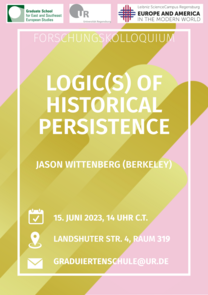

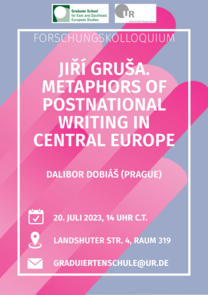
Winter Semester 2022/23
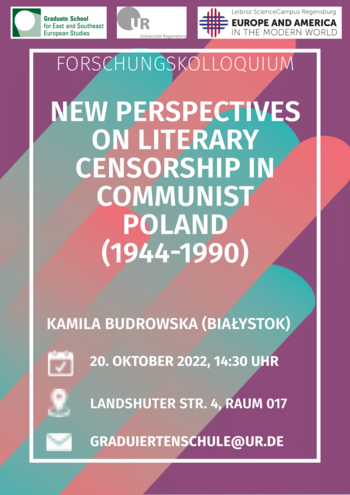
20 October 2022 | 14:30
New Perspectives on Literary Censorship in Communist Poland, 1944–1990
Kamila Budrowska (Białystok)
This lecture outlines the forms of censorship and how they functioned in communistera Poland. Drawing on my extensive research on literary censorship, the lecture will offer insight into the broader context relating both to the study of censorship today – including methodological and conceptual issues – and also to how censorship institutions and practices developed under communism – including the transnational influence of the Soviet Glavlit and the legal basis for Polish state censorship. A key aspect of the lecture explores how censorship policy and practices shifted over time, becoming variously more and less stringent. I show that key factors in this were: chronological, revealing the historical and political contingency of censorship; thematic, with banned and restricted topics changing; and personal, with writers treated differently according to their perceived standing.
Kamila Budrowska is professor at the Faculty of Philology at Białystok University and head of the Department of Philological Studies. She is the author of over a hundred publications on literary censorship in the years 1945-1989.
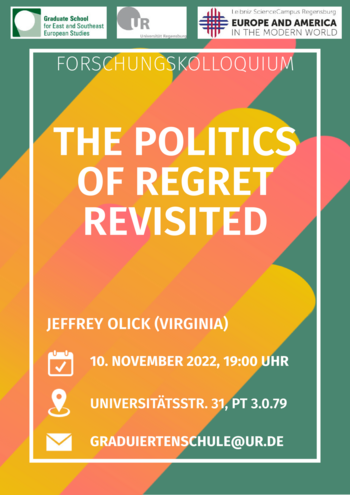
10 November 2022 | 19:00
The Politics of Regret Revisited
Jeffrey K. Olick (Virginia)
In the talk, Jeffrey Olick will review the trajectories of what he’s called the politics of regret — acknowledging and apologizing for difficult pasts — from its heyday in the 1990s through the last two decades, with a focus on transformations in the last five years. He will give particular attention to debates over postcolonial memory in Europe (with particular attention to recent German debates) and to the end of what he has called American exceptionalism in memory politics following the murder of George Floyd and the rise of BLM (showing how the discourses are intertwined).
Jeffrey K. Olick is William R. Kenan, Jr. Professor of Sociology and History at the University of Virginia. He is Co-President of the Memory Studies Association and an elected member of the Sociological Research Association. He has made seminal contributions to the field of memory studies, including as co-editor of The Collective Memory Reader (with Vered Vinitzky-Seroussi and Daniel Levy; Oxford University Press, 2011). He first addressed the theme of this talk in The Politics of Regret: On Collective Memory and Historical Responsibility (Routledge 2007). His most recent publication is as co-editor of Regions of Memory: Transnational Formations (Palgrave, 2022).
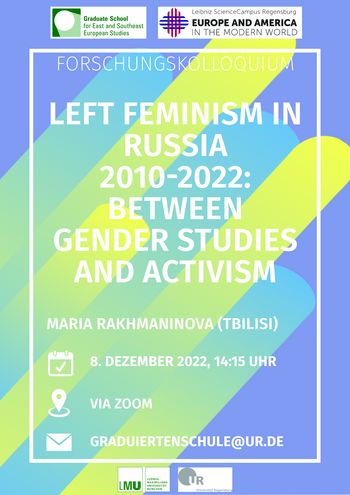
8 December 2022 | 14:15
Left Feminism in Russia 2010–2022: Between Gender Studies and Activism
Maria Rakhmaninova (Tbilisi)
The early 2010s in Russia were marked by new aspirations and milestones in the development of feminism. This was due, on the one hand, to the intensive and diverse reception of foreign sources on gender theory, and, on the other, to the emergence and rapid intensification of new authoritarian tendencies in Russian social and economic policy. Among other currents, the left wing of feminism deserves special attention: socialist feminism, Marxist (Trotskyist) feminism, and anarcho-feminism. The talk examines the main features, peculiarities and problems of this spectrum of feminist thought and practice and attempts to outline their path and current state.
Mario Rakhmaninova is a Russian specialist in social and political philosophy, a doctor of philosophy. Her fields of interest are society, the state, anarchism, feminism, protest movements, theories of revolution, art, aesthetics, pedagogy and philosophy of animals.
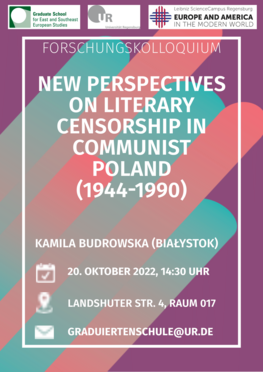
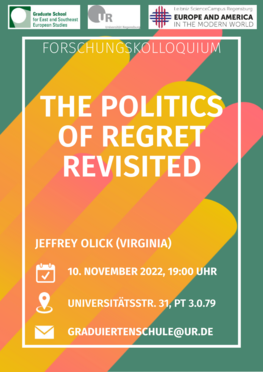
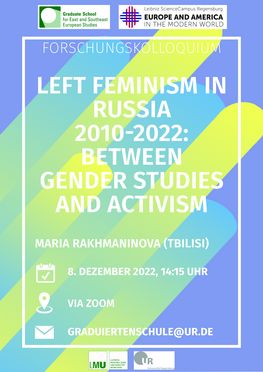
Summer Semester 2022

28 April 2022 | 14:15
“Cold War Instruments”? Exiles from East Central Europe in U.S. political warfare
Anna Mazurkiewicz(Danzig)
While examining psychological and political warfare the term “instrument” appears in the context of the Free Europe Committee (FEC). This organization, while ostensibly “privately managed” was an unattributed asset of the US government. It sponsored the Assembly of Captive European Nations (ACEN) – an umbrella organization of exiled politicians from East Central Europe. Even by the late 1950s, the FEC considered the ACEN “most effective instrument at FEER disposal in the national and international organization field for use in the representational pressure on governmental and political personalities in the Free World” - a notion vehemently contested by the exiles, as they in fact advanced U.S. political agenda in the truly global forums.
Anna Mazurkiewicz is an Associate Professor at the Faculty of History, University of Gdansk, Poland. She is spending summer semester 2022 as a Leibniz ScienceCampus Visiting Professor at the University of Regensburg. She holds the Chair in Contemporary History at the Faculty of History in Gdansk, where she also leads the work of the interdisciplinary International Border Studies Center.
 12 May 2022 | 14:15
12 May 2022 | 14:15
Types of Language Conflicts – with a Focus on Russia and Ukraine
Monika Wingender(Giessen)
Research on linguistic conflicts in Eastern Europe form part of a long-standing tradition. Studies of language conflicts have typically been based in research addressing of bi- and multi-linguality, with language conflict studies seen as part of language contact studies. Because this rather narrow approach cannot do justice to the diversity of linguistic conflicts, the focus in the first part of this lecture will be on outlining a broader model of linguistic conflict studies. A key aim of my research is to develop a typology of linguistic conflicts. What this requires is a multifactorial model that encompasses four types of linguistic conflicts that will be explored with attention to points of overlap and correlation. The second part of the lecture will draw on cases from Russia and Ukraine to illustrate these types of linguistic conflicts.
Monika Wingender is professor of Slavic linguistics at the Justus Liebig University, Giessen. She has an extensive research record in studying linguistic conflicts. Most recently, she has co-edited with Daniel Müller the volume Language Politics, Language Situations and Conflicts in Multilingual Societies. Case Studies from Contemporary Russia, Ukraine and Belarus (Wiesbaden, 2021).
 12 May 2022 | 16:00
12 May 2022 | 16:00
Multiple times of planning: European and Soviet models of job motivation in the 1920s–60s
Alexander Bikbov (Paris)
Institutional history and historical sociology of the Cold War frequently associate the planned ecoomy with the Soviet political regime. In fact, the core Soviet vocabulary, composed in the early 1920s and rebuilt in the late 1950s, explicitly referred to planning and science. An even more intriguing part of the story consists in the fact that ideas of scientific planning, rational government and creating a new man, were also part of the projects of the new Europe following the end of the World War II and thoroughly assisted by the US administration and private foundations. The reconstruction of Europe which started with the Marshall Plan in the late 1940s and made several impressive advancements in the 1950s, including productivity missions serving as a testing ground for new tools of expert-based public management. These specific forms of assisted public management resulted in national programs of sustainable growth, such as the French five-year Plan de modernisation et d’équipement. In the 1960s, the European planning managers established contacts with socialist countries, within the framework of supranational organizations such as UNESCO, as well bilateral conventions. This period is marked by a global concern for institutionally assured free time and leisure, which rose on the both sides of the Iron Curtain. I examine the variety of expert-based ways to implement humans to work and to manage their leisure, in two formally opposed political universes.
Alexander Bikbov is a sociologist and public intellectual. He is currently an invited professor at École des Hautes Études en sciences sociales, Paris, and a former lecturer at Moscow State University. He is the research coordinator on a special project on protests, an organiser and participant of public initiatives on critical analysis of Russian and international reforms of the public sphere. He is the author of publications on protest movements, the perception of inequalities, the sociology of knowledge, and historical sociology of concepts.
 9 June 2022 | 14:15
9 June 2022 | 14:15
Travels across Language: Cosmopolitanism Made/Unmade
Galin Tihanov (London)
The focus is on the centrality of exile and exilic writing in the making and unmaking of our modern notions of cosmopolitanism. Not only is writing about exile a specific mode of producing a particular version of the world; it is also a way of thinking about movement, mediations, transfers, and boundaries - all of this through the prism of language, and in response to the most important question a literary scholar could ever ask: what happens to language. Exile is one of the foundational discourses of modernity in that it interrogates the nexus of memory, identity, and language and sets the parameters of belonging and exclusion. Today’s endorsement of cosmopolitanism, as much as its critique, is inseparable from our capacity to reflect on exilic experiences and the heterogeneous practices of exilic writing. He starts the paper by establishing what he believes to be two different types of cosmopolitanism; then he draw attention to two different genres of exilic writing: a piece of what one might call "philosophy of culture" (1920) and a couple of novels, both speaking directly to past and present concerns of relevance to Central and Eastern Europe.
Galin Tihanov is the George Steiner Professor of Comparative Literature at Queen Mary University of London.
 7 July 2022 | 14:15
7 July 2022 | 14:15
Poland-Lithuania in the Age of the Atlantic Revolution
Richard Butterwick-Pawlikowski(London)
From the 1760s to the 1790s, the upheavals of the Polish-Lithuanian Commonwealth were connected to revolutionary changes in ideas and power on both sides of the Atlantic. The Enlightenment revealed much in the Polish-Lithuanian world in need of renewal, but it also lit up potential for growth. Ideas generated abroad interacted fruitfully with home-grown intellectual traditions. The dilemma posed by the ancient Roman historian Sallust – ‘perilous liberty’ or ‘tranquil servitude’? – briefly seemed capable of resolution as ‘orderly freedom’, after the Four Years’ Sejm (parliament) of 1788-1792 had acclaimed the Constitution of May 3, 1791. However, the country’s neighbours – Russia, Prussia and Austria – destroyed this felicitous future by the second and third partitions in 1793 and 1795. The paper is framed by the figure of Tadeusz Kościuszko (1746-1817), hero of the War of American Independence and leader of the 1794 insurrection in Poland-Lithuania against Russian dominance, ‘the purest son of liberty’ (according to Thomas Jefferson), who personified the ‘Atlantic Revolution’ on both sides of the ocean.
Richard Butterwick-Pawlikowski is Professor of Polish-Lithuanian History and Head of Research at the School of Slavonic and East European Studies (SSEES) at University College London (UCL). He will be a visiting fellow at the ScienceCampus, based at IOS, throughout July 2022. He received his BA and MA from Cambridge, before gaining a PhD at Oxford and a habilitation degree from the Polish Academy of Sciences (PAN). He moved to UCL-SSEES from Belfast in 2005 and was made professor in 2013. He is a specialist in the history of the Polish-Lithuanian Commonwealth, with his most recent book The Polish-Lithuanian Commonwealth 1733–1795: Light and Flame, published by Yale University Press in 2020.
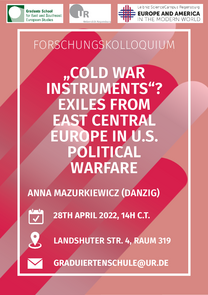
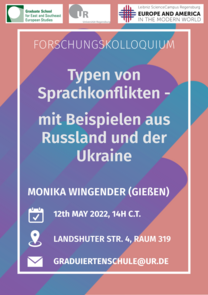
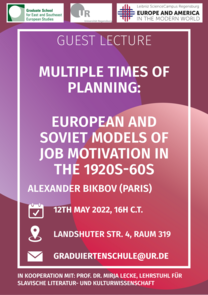
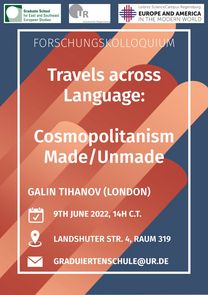
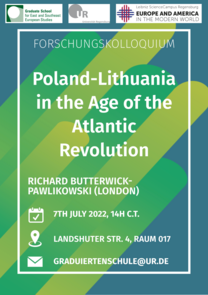
Winter Semester 2021/22
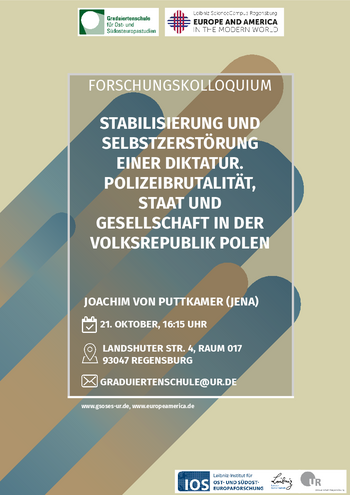 21 October 2021 | 16:15
21 October 2021 | 16:15
Stabilisierung und Selbstzerstörung einer Diktatur. Polizeibrutalität, Staat und Gesellschaft in der Volksrepublik Polen
Joachim von Puttkamer (Jena)
Im Vergleich der ostmitteleuropäischen Diktaturen gilt die Volksrepublik Polen als vergleichsweise milde. Dabei kamen Monat für Monat Menschen in polizeilichem Gewahrsam ums Leben, Oppositionelle ebenso wie völlig unpolitische Menschen. Der Vortrag untersucht die Ursachen polizeilicher Brutalität ebenso wie die Versuche, sie einzuschränken, und fragt nach deren Rolle für den Erhalt wie den Untergang des staatssozialistischen Regimes.
Joachim von Puttkamer ist Lehrstuhlinhaber und Co-Direktor des Imre Kertész Kollegs in Jena. Seine Forschungsschwerpunkte umfassen Staatsbildung und Staatlichkeit im östlichen Europa, Nationalismus in Ostmittel- und Südosteuropa, Schul- und Bildungsgeschichte, osteuropäische Erinnerungskulturen und historischer Vergleich.
 16 December 2021 | 14:15
16 December 2021 | 14:15
Writing the Translocal History of an Arab City: Methodological and Conceptual Considerations
Ulrike Freitag (Berlin)
This presentation connects the central idea of my recently published History of Jeddah (CUP 2020) to wider conceptual and methodological concerns at Leibniz-Zentrum Moderner Orient. The institute’s work has been characterised by a strong interest in translocality as a research perspective. More recently, the institute is also focussing more systematically on emic concepts, investigating how these might connect with, inform and possibly change the conceptual terminology with which we investigate non-Western pasts and presents. More concretely, what happens to the Western notion of ‘cosmopolitanism’ when transplanted into a self-consciously Islamic port city?
Ulrike Freitag is Director of the Leibniz-Zentrum Moderner Orient (ZMO) in Berlin, in conjunction with a full special professorship (S-Professur) at the Institute of Islamic Studies at Freie Universität Berlin.
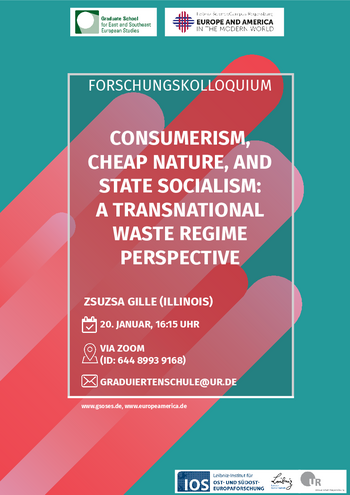 20 January 2022 | 16:15
20 January 2022 | 16:15
Consumerism, Cheap Nature, and State Socialism: A Transnational Waste Regime Perspective
Zsuzsa Gille (Urbana/Illinois)
The goal of this lecture is to reevaluate state socialism’s environmental record from a transnational rather than a comparative perspective. I will argue that state socialist modernity had its own view of nature and materials, as well as a largely misunderstood ethical stance to consumption that is ignored in today’s studies of Capitalocene examining the interrelations of capitalism and climate crisis. The presentation will provide an overview of the environmental advantages and disadvantages of central planning with an eye to demonstrating how Cold-War-era trans-bloc relations and a unique socialist economic logic mutually constituted each other. Instead of returning to the rightfully criticized Anthropocene term, I will argue for a more central role for waste and materiality in our understanding of the current dilemmas around global environmental problems.
Zsuzsa Gille (Urbana/Illinois) is Professor of Sociology at the University of Illinois at Urbana-Champaign. She has published on issues of qualitative methodology as it relates to globalization and new concepts of space, on environmental politics and on the sociology of food. Her research interests are environmental sociology, Eastern Europe, European Union, global and transnational sociology, sociology of consumption, food, knowledge, materiality, waste, contemporary social theory and ethnography.
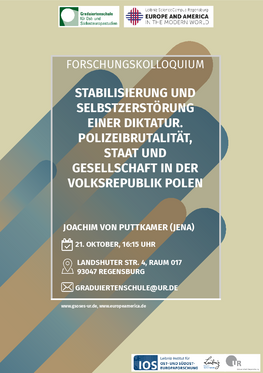

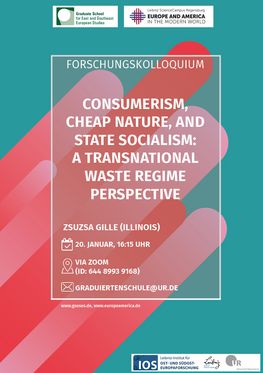
Summer Semester 2021
 15 April 2021 | 16:15
15 April 2021 | 16:15
Negotiating Non-Territorial Citizenship: The Polish Consulate in Harbin during the Second World War
Kathryn Ciancia (Madison)
After the territory of Poland was divided between the Soviet Union and Nazi Germany in September 1939, a government-in-exile resumed the tasks of granting, removing, and revoking Polish citizenship in its consulates across the world. In this talk, I will reconstruct some of the cases filed by men and women at the Polish consulate in the historically Russian and Chinese city of Harbin, then under Japanese occupation, and trace the responses from local and central officials. By following the trajectories of both Jewish and Catholic applicants, the talk will explore how the criteria for citizenship intersected with ongoing questions of what it meant to be Polish, even in the absence of a territorial state.
Kathryn Ciancia is a historian of modern Eastern Europe and associate professor of history at the University of Wisconsin-Madison with a research focus on Poland in the first half of the twentieth century.
 6 May 2021 | 16:15
6 May 2021 | 16:15
The Postcolonial and the Postsocialist Revisited, or A decolonial view of the post-soviet human condition
Madina Tlostanova (Linköping/ Sweden)
Many works have been written on various specific intersections of the postcolonial and the postsocialist as temporalities, sensibilities and analytical lenses. A decolonial view offers additional angles to the picture introducing categories of the imperial difference, modernity/coloniality, the geopolitics and corpopolitics of knowledge, etc. and allows to shift the discussion from the description of the specific regional histories to postcolonialism and postsocialism as current global predicaments and also potentially, as a dialogical space for the emergence of “deep coalitions” (Lugones) and global alliances for refuturing. In the talk I will focus on some decolonial impulses in the post-Soviet/post-colonial spaces and subjectivites in arts and social movements.
Madina Tlostanova is professor of postcolonial feminisms at Linköping University (Sweden). Her interests focus on decolonial thought, indigenous feminisms and feminisms of the Global South, the postsoviet/postcolonial human condition, fiction and art.
 17 June 2021 | 16:15
17 June 2021 | 16:15
Warum tolerieren Autokraten kritische Medien? Eine neue Theorie nicht-demokratischer Öffentlichkeit und empirische Befunde aus der postsowjetischen Region
Florian Töpfl (Universität Passau)
Die Mehrzahl aktueller sozialwissenschaftlicher Studien zu nicht-demokratischen Mediensystemen geht davon aus, dass autoritär regierende Eliten durchwegs darauf abzielen, öffentliche Kritik mittels eines breiten Spektrums an repressiven Maßnahmen zu „zensieren“ oder zu „kontrollieren“. Im Gegensatz hierzu argumentiert dieser Vortrag, dass kritische Teilöffentlichkeiten in autoritären Staaten auch als „Input Institutionen“ begriffen werden können, die für autoritäre Eliten nicht nur Risiken bergen sondern auch wichtige Aufgaben erfüllen. Nach einer Vorstellung dieser neuen „Theorie autoritärer Öffentlichkeit“ wird deren Anwendung anhand ausgewählter eigener empirischen Studien aus der postsowjetischen Region illustriert.
Florian Töpfl ist Inhaber des Lehrstuhl für Politische Kommunikation mit Schwerpunkt auf Osteuropa und die postsowjetische Region an der Universität Passau. In seinen aktuellen Forschungsarbeiten untersucht er den informationellen Einfluss russischer Eliten auf ausländische Medienpublika. In früheren Projekten beschäftigte er sich mit den Beziehungen zwischen neuen Medien und Politik in nicht-demokratischen Regimen, wobei der geographische Fokus hierbei auf Russland und der postsowjetischen Region lag.
 1 July 2021 | 16:15
1 July 2021 | 16:15
The Cognitive Empire and Coloniality of Knowledge in Africa
Sabelo J. Ndlovu-Gatsheni (Bayreuth)
Can knowledge be colonized? How is knowledge colonized? How do we decolonize knowledge? These three questions cannot be clearly responded to without an understanding of the cognitive empire. This is an empire that enables coloniality of knowledge. Therefore, this lecture delves into the politics of knowledge with a focus on introduction of the concept of the cognitive empire, articulation of its operative logics and its consequences. This takes us to the present global economy of knowledge and how Africa has been fighting for decolonization of knowledge. So, the lecture delves into what is decolonization and how it can be done in the present conjuncture, where there is turmoil within the republic of letters and the world of knowledge.
Sabelo J. Ndlovu-Gatsheni is Professor and Chair of Epistemologies of the Global South with Emphasis on Africa at the University of Bayreuth in Germany. He is a leading decolonial theorist with over a hundred publications in the fields of African history, African politics, African development and decolonial theory.
The ScienceCampus and the Graduate School are pleased to be collaborating with the CITAS Research Network KNOW-IN: Knowledge Infrastructures: Circulation, Transfer and Translation of Knowledge across Borders in presenting this lecture in the joint Research Colloquium. KNOW IN explores the interconnections between infrastructures and knowledge production and the processes of circulation, transfer, and translation they facilitate across and beyond borders. On 1–2 July, it organized the international workshop "Exploring Trans/Regionality: The Workings of Infrastructures and the Production of Knowledge".
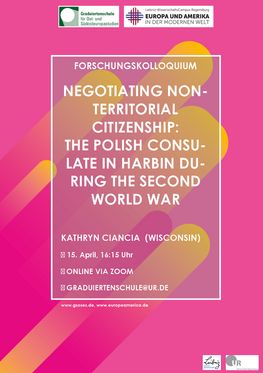
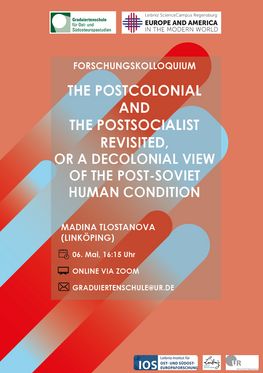
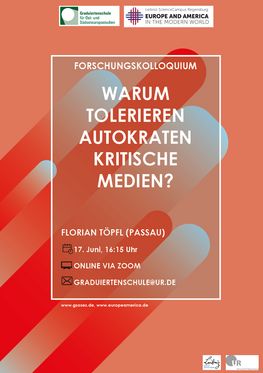
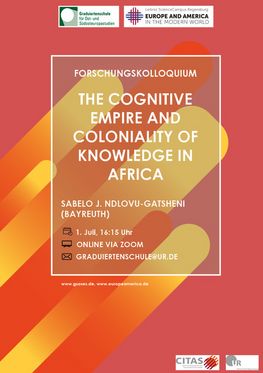
Winter Semester 2020/21
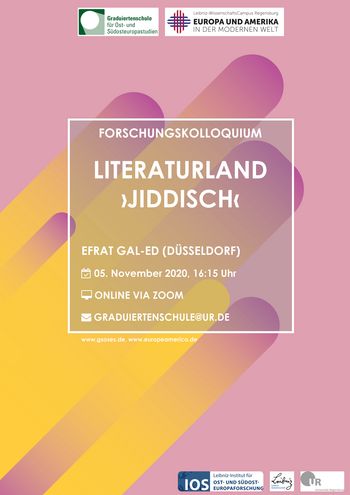 5 November 2020 | 16:15
5 November 2020 | 16:15
Literaturland ›Jiddisch‹
Efrat Gal-Ed (Düsseldorf)
Eine wichtige Antwort auf die Erschütterungen der jüdischen Lebenswelt durch den Ersten Weltkrieg war das Projekt der jiddischen Moderne. Hauptakteure der Gestaltung dieses Gegenentwurfs zu den bestehenden Verhältnissen waren die Schriftsteller; die Hauptrolle spielte die entstehende jiddische Literatur. Diese Minoritätsliteratur entfaltete sich weltweit quer durch die verschiedenen Nationalstaaten hindurch und im ständigen Kontakt mit den sie umgebenden Mehrheitskulturen. Wo sie existierte, war sie fremd, geprägt von der Spannung zwischen kultureller Differenz und transkulturellem Selbstverständnis der Autoren. Jiddisch-modernistische ästhetische Programme zeugen von der Bindung an Werte und Modelle der europäischen Moderne und zielten auf die Zugehörigkeit zur Weltliteratur. Doch dazu bedurfte es einer externen Stärkung, der Anerkennung der ›kleinen Literatur‹ durch eine europäische Institution. Dies geschah, als 1927 die staatenlose jiddische Literatur Mitglied des Internationalen PEN-Clubs wurde. Von da an begannen jiddische Autoren ihren geographisch fragmentierten Kulturraum und die jiddische Literatur mit ihren Zentren in Warschau, Wilna, Kiew, Moskau und New York als ein Literaturland aufzufassen; es entstand ›das Land Jiddisch‹.
In meinem Vortrag wird der Diskurs jiddischer Intellektueller um die Fragmentierung ihres Literaturraums rekonstruiert, in dem das kosmopolitische Kulturprojekt entstand, das ursprünglich ›das Land Jiddisch‹ und später ›Jiddischland‹ genannt wurde: die Wortrepublik, welche Jiddischsprechende über Literatur und Kunst weltweit vereinte.
Efrat Gal-Ed, geboren 1956 in Tiberias, Israel, studierte Judaistik, Germanistik und Komparatistik sowie Malerei und promovierte in Jiddistik. Sie lebt als Malerin und Autorin in Köln und lehrt jiddische Literatur und Kultur an der Heinrich-Heine-Universität Düsseldorf.
Summary
In this lecture, Efrat Gal-Ed offered insights into the emergence of Yiddish-language literature as a phenomenon that was simultaneously transnational and locally rooted. While texts were disseminated across national and indeed continental boundaries, how they were written were inflected by local conditions and relations with dominant literatures and cultures in the societies where authors lived. Yiddishland was, then, an essentially "glocal" phenomenon produced through ongoing translations. Thus while it was a global phenomenon, its local inflections meant that Yiddish literature could not immediately make claims to being "world literature" - nor did it seek to. The multiple-scales and localities that influenced it, gave it a utopian urge, creating a sense of a "mobile homeland", or tragbare Heimat as she called it, meaning that it could never be pinned down, in the immediate post-WWI period, to a particular location but instead spoke to the tensions and frictions of a yearning for both localized autonomy and broader community.
Efrat Gal-Ed was invited to speak in the series by Sabine Koller, who is co-coordinator of the ScienceCampus module Verheimatlichung: Practices of Belonging. The talk addressed the core themes of that module, namely how is a sense of home created or disrupted, within the broader context of the global transformations, connections and transfer that have shaped Europe and America.
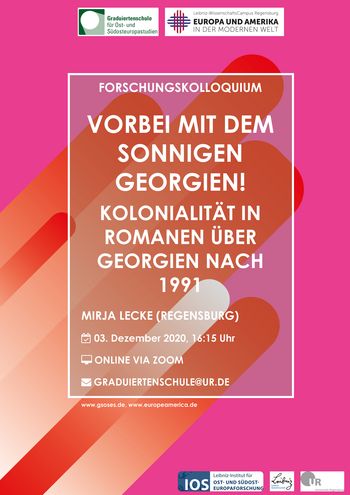 3 December 2020 | 16:15
3 December 2020 | 16:15
Vorbei mit dem sonnigen Georgien! Kolonialität in Romanen über Georgien nach 1991
Mirja Lecke (Regensburg)
Im Vortrag werden koloniale Konstellationen in literarischen Texten über und aus Georgien untersucht. Auf Grundlage von methodischen Ansätzen von Walter Mignolo, Cristina Șandru und Madina Tlostanova werden drei Romane analysiert. „Die Reise nach Karabach“ (1992) des Georgiers Aka Morchiladze, „Der Russophone” vom russischen Schriftsteller Denis Gucko (2005) und der deutschsprachige Bestseller „Das achte Leben. Für Brilka” (2014) von Nino Haratischwili. Alle drei Texte zeigen, was Mignolo „Kolonialität“ nennt, wenngleich auf sehr unterschiedliche Weise. In ihnen überlappen und durchdringen sich verschiedene koloniale, fremde Blicke auf Georgien.
Mirja Lecke ist seit April 2020 Professorin für Slavische Literatur- und Kulturwissenschaft an der Universität Regensburg. Ihre Forschungsinteressen sind russische Literatur der imperialen und postsowjetischen Periode in postkolonialer Perspektive, insbesondere russisch-georgische, russisch-polnische und ukrainisch-polnische Verflechtungen in der Literatur.
 14 January 2021 | 16:15
14 January 2021 | 16:15
Buchbesprechung: "Forging Global Fordism" mit Vortrag: "Von der Arbeitsteilung zur Entwicklungskonkurrenz: Die große Krise 1927-1934 als globaler Wendepunkt"
Stefan Link (Dartmouth)
In Anschluss an Karl Polanyi schlägt der Vortrag vor, die große Krise der 1930er Jahre als "Great Transformation" zu betrachten – als Wendepunkt zwischen zwei Epochen der Globalisierung. Die Weltwirtschaftsordnung des 19. Jahrhunderts war geprägt von der imperialen Arbeitsteilung zwischen westlichen Industriezentren und (semi-)kolonialen Rohstoff- und Agrarproduzenten. In Folge der Krise jedoch begann die Industrialisierung der Peripherie. Dies legte die Grundlage für die Dynamik der nationalstaatlichen Entwicklungskonkurrenz, die die Weltwirtschaftsordnung seit der zweiten Hälfte des 20. Jahrhunderts prägt.
Zum Buch
Als die USA in den ersten Jahrzehnten des 20. Jahrhunderts zu ihrer Vormachtstellung aufstieg, assoziierten Beobachter*innen aus dem Ausland die amerikanische Wirtschaftsmacht vor allem mit der wachsenden US-Autoindustrie. In den 1930ern strömten Ingenieur*innen aus der ganzen Welt nach Detroit mit der Absicht, Amerika nachzuahmen und herauszufordern. Unter ihnen waren viele Spezialist*innen aus der Sowjetunion und dem NS-Staat, die versuchten, die Techniken der amerikanischen Massenautoproduktion, auch Fordismus, zu beobachten, zu kopieren und manchmal auch zu stehlen. Forging Global Fordism verfolgt, wie Deutschland und die Sowjetunion Fordismus aufgriffen in einer Zeit, die von Wirtschaftskrisen und ideologischen Umbrüchen geprägt war.
Forging Global Fordism hinterfragt die Annahme, dass die globale Massenproduktion ein Produkt des liberalen Internationalismus der Nachkriegszeit war. Das Buch zeigt, dass die Massenproduktion bereits in den globalen 1930er Jahren begann und dass die Verbreitung des Fordismus einen ausgesprochen illiberalen Entwicklungsverlauf hatte.
Lecture: From the Division of Labour to Development Competition: The economic crisis of 1927–1934 as a global turning point
Drawing on Karl Polanyi, this lecture argues that the economic crisis of the 1930s should be considered a “Great Transformation”. It was thus a turning point between two epochs of globalization. The economic world order of the nineteenth century was shaped by an imperial division of labour between Western industrial centres and (semi-)colonial producers of raw materials and agricultural goods. One outcome of the crisis, however, was the industrialization of peripheries. This laid the foundations for the dynamics of development competition between nation states, which came to shape the economic world order of the second half of the twentieth century.
Book summary
As the United States rose to ascendancy in the first decades of the twentieth century, observers abroad associated American economic power most directly with its burgeoning automobile industry. In the 1930s, in a bid to emulate and challenge America, engineers from across the world flocked to Detroit. Chief among them were Nazi and Soviet specialists who sought to study, copy, and sometimes steal the techniques of American automotive mass production, or Fordism. Forging Global Fordism traces how Germany and the Soviet Union embraced Fordism amid widespread economic crisis and ideological turmoil.
Forging Global Fordism challenges the notion that global mass production was a product of post–World War II liberal internationalism, demonstrating how it first began in the global thirties, and how the spread of Fordism had a distinctly illiberal trajectory.
Stefan Link is associate professor of history at Dartmouth College, Hanover, New Hampshire. He specializes in economic history, business history, and the intellectual history of capitalism. He received his PhD from Harvard in 2012.
 4 February 2021 | 16:15
4 February 2021 | 16:15
Transatlantic and Comparative Perspectives on financial crises in the second half of the 19th century
Catherine Davies (Zürich)
Panics and crashes were central features of nineteenth century capitalism. In 1857 and 1873, financial crises erupted in the United States and in several European countries, causing havoc, a wave of commercial failures, unemployment and poverty. The growth of international trade and credit networks, aided by advances in transportation, communication and production, meant that financial disruptions were no longer isolated local or national events. Economic commentators, policy makers, entrepreneurs and journalists struggled to make sense both of this growing interconnectedness and of the emerging recurrence of episodes of overspeculation and downturns; liberal politico-economic accounts of the (ir)rationality of entrepreneurial activity co-existed alongside religious indictments of the amorality of the capitalist marketplace. An integrated transatlantic history of financial panics shows how differences and commonalities in responses were shaped by both institutions and culture.
Catherine Davies is senior assistant professor in history at the University of Zürich, having gained her PhD at FU Berlin. She is currently working on a history of sexual violence in West Germany. Her book, Transatlantic Speculations: Globalization and the Panics of 1873, appeared with Columbia University Press in 2018. She has published extensively on the history of financial crises and their connections to globalization and democracy.
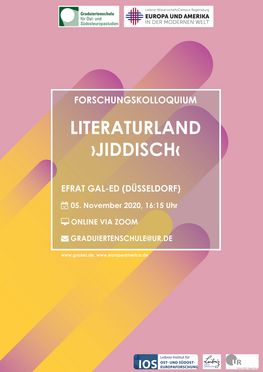
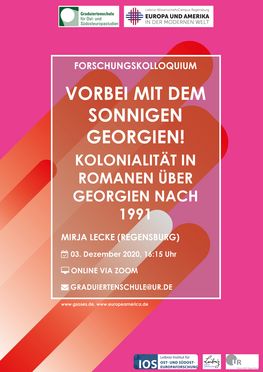
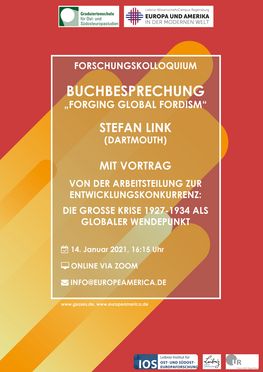
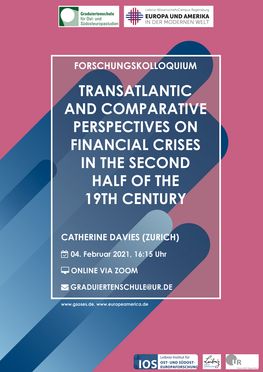
Summer Semester 2020
 23 April 2020, 16:15, via Zoom
23 April 2020, 16:15, via Zoom
The lecture is available to view online on the Graduate School YouTube channel.
Die Ölsardine und Area Studies: Arbeitswelten, Fischkonserven und das Meer seit dem 19. Jh., Ulf Brunnbauer
In dem Vortrag wird sich alles um die Sardinendose drehen, ein unbesungener Held des Industriezeitalters. Ausgehend von der Entstehung der Fischkonservenindustrie an der Adria im späten 19. Jh. (als Beginn der industriellen Transformation der damals noch österreichischen Küstengebiete), mit Sprüngen nach Kalifornien und John Steinbeck ("Cannery Row", 1945) und zurück nach Istrien, will ich anhand des Allerweltprodukts der Sardinendose Arbeits-, Wirtschafts- und Umweltgeschichte mit den Area Studies zusammenbringen. Denn in der Fischkonserve stecken reichhaltige Geschichten, die uns die Folgen von technologischem Wandel und Globalisierung auf lokale Gemeinschaften besser vestehen lassen. Zumal: Wer wollte nicht schon immer wissen, worin das Geheimnis des Superfoods aus der Adria besteht?
Canned Sardines and Area Studies: The World of Work, Cans of Fish and the Sea since the Nineteenth-Century
Canned sardines are the focus of this lecture. They are the unsung heroes of the industrial age. Starting with the emergence of the fish processing industry on the Adriatic Coast in the late-nineteenth century, which marked the beginning of the industrial transformation of the then-Austrian coastal region, the lecture also leaps over to California and John Steinbeck’s Cannery Row (1945), before returning to Istria. Exploring this everyday product, I will use canned sardines to shed light on the worlds of work, the economy and environmental history, putting them in the context of area studies. Canned fish contain fascinating histories that allow us to better understand the consequences of technological change and globalization on the local levels. After all, who would not like to know more about the secret ingredients that make up the superfood of the Adriatic?
Ulf Brunnbauer, Director of IOS and Speaker of the Leibniz ScienceCampus, Europe and America in the Modern World, gave the opening lecture of the new joint Research Colloquium co-organized with the Graduate School for East and Southeast European Studies.
Summary
This was the first lecture in the joint Graduate School and Science Campus Research Colloquium. It was also the first test of large-scale use of video conferencing technology for our institutions. It worked smoothly and we were pleased that over forty people attended the lecture in virtual form. This included colleagues from universities and institutions in Spain and Croatia, as well as from Leipzig, Berlin and Munich, who might otherwise not have attended in person. The enforced shift to online communication thus has some benefits in terms of opening up our work in Regensburg to national and international audiences.
In his lecture, Ulf Brunnbauer outlined the significance of the history of tinned sardines and the related processing infrastructure and migrations for area studies. This case study can reveal the frictions and ambiguities of globalization through a focus on place-specific thick description. This approach opens up comparative horizons, enabling a global perspective on the divergent experiences of globalization without necessarily finding entanglements. The Croatian and American, both US and South American, sardine industries have experienced similar processes of encouraging migrant labour, outsourcing of production and being affected by environmental factors. But local and regional specificities have seen the industries develop differently. Whereas the North American industry has largely moved to Latin America, leaving traces only in industrial heritage as a tourist attraction, the Croatian industry is thriving but has moved inland, to draw on Serbian labour and also to relieve pressure from the tourist sector that has its eyes on the prime coastal real estate.
Ultimately, then, everyday consumer items, like tinned fish, can reveal some big questions addressed in area studies – and other comparative fields – related to globalization, such as labour migration, gender relations and job security, environmental history and sustainability, industrialization and post-industrialization, and the nature of global supply chains.
 28 May 2020, 16:15, via Zoom
28 May 2020, 16:15, via Zoom
The lecture is available to view online on the Graduate School YouTube channel.
Hungary's Drift to What? Evaluating 10 Years of Fidesz in Power
Robert Austin, Munk School of Global Affairs and Public Policy, University of Toronto
In 2010, Viktor Orbán began his second mandate as Hungarian Prime Minister. For Orbán, 2010 was the real 1989 moment for Hungary. Since the “Revolution at the Polls” Orbán’s Fidesz Party has transformed Hungary politically and economically by winning super majorities in the parliamentary elections in 2014 and 2018. This new political system, whatever you want to call it, has been extremely controversial and often put Hungary at odds with the European Union (EU). Nevertheless, Orbán has persisted in his efforts to not only remake Hungary but also offer a new sovereigntist and nationalist agenda for other EU member states. This seminar evaluates the major changes under Hungary’s system of “national cooperation” and the prospects for democracy overall. In short, is Hungarian democracy dead and does it even matter for Europe’s future?
Wohin bewegt sich Ungarn? Eine Einschätzung der 10 Jahre mit Fidesz an der Macht
2010 begann Viktor Orbáns zweites Mandat als ungarischer Ministerpräsident. Für Orbán war 2010 Ungarns wahrer „1989-Moment“. Seit der „Revolution an den Wahlurnen“ hat Orbáns Fidesz-Partei Ungarn politisch und wirtschaftlich verändert, nachdem sie bei den Parlamentswahlen 2014 und 2018 mit Zweidrittelmehrheiten gewann. Dieses neue politische System, wie auch immer man es bezeichnen möchte, ist seitdem sehr umstritten und hat häufig zu Konflikten zwischen Ungarn und der EU geführt. Dennoch hält Orbán fest an seinem Bestreben, nicht nur Ungarn zu erneuern, sondern auch anderen EU-Mitgliedsstaaten eine neue souveränistische und nationalistische Agenda anzubieten. Dieses Seminar gibt eine Einschätzung zu den wesentlichen Veränderungen unter Ungarns System der „nationalen Kooperation“ und den generellen Aussichten der Demokratie. Kurz gesagt: ist die ungarische Demokratie tot und spielt das überhaupt eine Rolle für die Zukunft Europas?
Robert C Austin is a specialist on East Central and Southeastern European history and contemporary society. He is Associate Director of The Centre for European, Russian, and Eurasian Studies (CERES) in Toronto. He once served as Tirana-based correspondent for Radio Free Europe/Radio Liberty, has collaborated with numerous other media organizations and written for leading newspapers and scholarly journals. He has lectured widely in Europe and North America. His most recent book, “Making and Remaking the Balkans: Nations and States since 1878”, was published with the University of Toronto Press in May 2019. He is now writing a popular history of Central Europe since 1848.
Summary
Robert Austin gave a highly engaging talk on the past decade of government by the populist Fidesz party in Hungary. He set the party’s approach, and the concerns of the EU, within the historical context of previous less-than-democratic regimes in Hungary. Much of Fidesz’s attempts to secure legitimacy have sought to present the end of communism in 1989 and the subsequent transition as a time of unfulfilled promises. Robert Austin drew particular attention to the need to consider the Fidesz’s rise to power in the context of the harmful consequences of the financial crisis of 2008 and how the party’s economic competence indeed brought it some legitimacy. Ultimately, though, the anti-democratic approach to media law, migration and the judiciary, as well as Hungary’s revisionist memory politics, are all worrying developments. He emphasized that it is worth remembering that Hungary has been in a state of emergency for several years now, with Fidesz seeking to present the large number of refugees who passed through Hungary in 2016 as a particular threat that could re-emerge. There have though been few imitators of the Hungarian model and no other country has gone as far as Orban’s government. Thus, he argued, despite Hungary’s own “hubris” and belief in the country’s significance, it is not notable enough to undermine the EU project as a whole. Still, in light of the uncertainty brought about by the COVID-19 pandemic, all bets are off.
 18 June 2020, 18:15, via Zoom
18 June 2020, 18:15, via Zoom
A Virtual Fireside Chat – Jeroen Dewulf in Conversation with Ulf Brunnbauer: Building Global, International and Area Studies at the University of California, Berkeley
Jeroen Dewulf, Director of the Institute of European Studies at UC Berkeley, will discuss how a world-leading university is developing its research and teaching expertise in the interconnected fields of global, international and area studies. Talking to Ulf Brunnbauer, Director of the Leibniz Institute for East and Southeast European Studies (IOS) in Regensburg, Jeroen Dewulf will offer insight into what could be considered best practices in building expertise in these multidisciplinary fields.
Ein virtuelles Kamingespräch mit Jeroen Dewulf: Building Global, International and Area Studies at UC Berkeley
Jeroen Dewulf, Direktor des Institute of European Studies der UC Berkeley, wird darüber sprechen, wie eine der führenden Universitäten weltweit ihre Expertise in den miteinander verbundenen Bereichen der Global, International und Area Studies sowohl in der Forschung als auch in der Lehre weiterentwickelt. Im Gespräch mit Ulf Brunnbauer, Direktor des Leibniz-Instituts für Ost- und Südosteuropaforschung (IOS) in Regensburg, wird Jeroen Dewulf Einblick in die „Best Practices“ beim Aufbau von Expertise in diesen multidisziplinären Fachgebieten geben.
Jeroen Dewulf is Associate Professor in the Department of German, Queen Beatrix Professor in Dutch Studies, and the current Director of the Institute of European Studies. He graduated with a major in Germanic Philology and a minor in Portuguese Studies at the University of Ghent, holds an MA from the University of Porto and a PhD in German Literature from the University of Bern. Professor Dewulf’s research interests are as diverse as Dutch and Portuguese (post)colonial literature and history, transatlantic slave trade, Low Countries studies, Swiss literature and culture, and European politics in general.
Summary
In a wide-ranging and thoroughly engaging discussion, Jeroen Dewulf outlined the ways in which global, international and area studies are being developed at the University of California, Berkeley. Despite significant differences in funding models and the range of world regions covered, there are many parallels with efforts to develop area studies in Regensburg.
In a discussion chaired by Ulf Brunnbauer, he considered the pragmatic, structural, methodological and conceptual aspects involved in building collaboration between institutions and disciplines. Jeroen Dewulf presented some of the ways in which UC Berkeley and the collaborating institutions are seeking to address the challenges of internationalization, bringing teaching and research closer together, and making output in area studies visible to the public and policy-relevant.
These are all questions being tackled in Regensburg, hence the debate was particularly lively involving senior scholars, postdocs and doctoral researchers. The discussion focused on whether area studies requires strict definition and frameworks, or whether it is a more pragmatic perspective. The issue of disciplinary intersections was also elaborated in terms of balancing depth and theory- and model-building. The question of how to bring together area studies institutions with long-standing traditions and encouraging them to engage in comparative, transregional work was also part of the debate.
Jeroen Dewulf offered valuable insight into best practices and ongoing experiments in Berkeley, which will certainly shape developments in Regensburg, likewise through the partnership between institutions here, including the ScienceCampus, and those in California.
 23 July 2020, 16:15, via Zoom
23 July 2020, 16:15, via Zoom
On the Shoulder of Giants: The Figure of the "Transatlantic Emigrant" in Historiography
Heléna Tóth, University of Bamberg
One way to look at the historiography of transatlantic migration in the USA is through a series of paradigm shifts. From the first comprehensive works in the 1920s to the end of the last century the key terms historians used to conceptualize and describe migration processes changed from assimilation to acculturation, uprootedness, transplantation, to multi-directional migration systems. Each of these shifts emerged at the intersection of American domestic politics, international relations, changing migration economies, and, equally importantly, the transformation of history as an academic discipline. Based on a rereading of the seminal works of Arthur M. Schlesinger, Oscar Handlin and John Bodnar, the paper argues that at the core of these changes was a further factor: a shift in the historical imagination of the figure of the transatlantic emigrant. A close reading of these works suggests that while the historiography of transatlantic migration was (and still is) in general characterized by a striving towards a more complex understanding of migration processes, its story can also be told as a series of shifting blindspots.
Heléna Tóth is Lecturer at the Chair of Modern and Contemporary History. Her research interests include migration history and the history of rituals in Central and Eastern Europe in the nineteenth and twentieth centuries. Her current book project, “Life and Death under Communism”, explores rituals in communist societies. She received a doctoral degree from Harvard University in 2008. Her first book An Exiled Generation: German and Hungarian Refugees of Revolution, 1848-1871 appeared with Cambridge University Press in 2014.
